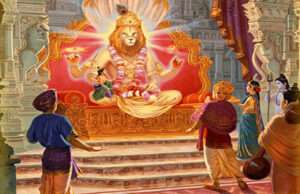As we progress, let us offer prayers like those of Prahlada Maharaja in Srimad Bhagavatam (7.9.39):
naitan manas tava kathasu vikuntha-natha
sampriyate durita-dustam asadhu tivram
kamaturam harsa-soka-bhayaisanartam
tasmin katham tava gatim vimrsami dinah
Dear Lord of the Vaikuntha planets, where anxiety is absent, my mind plunges into sin and lust and is situated now in so-called happiness, now in so-called pain. My mind fills with sorrow and fear and hunts for more and more money. Thus, it became contaminated, and it is never satisfied with listening to the speeches that concern You. Therefore, I am the most fallen and the poorest. In such a condition of existence, how can I talk about your activities?
Oh Krishna! How will I develop attachment to matters that concern You? And how will I be able to meditate on Your pastimes?
Srimad Bhagavatam (7.9.40) explains how the living entity attracted to sense objects such as form and taste is completely defeated:
jihvaikato ‘cyuta vikarsati mavitrpta
sisno ‘nyatas tvag-udaram sravanam kutascit
ghrano ‘nyatas capala-drk kva ca karma-saktir
bahvyah sapatnya iva geha-patim lunanti
Dear Lord, oh infallible, my position is like that of a man who has many wives, who try to attract him each in their own way. The tongue, for example, is attracted to tasty dishes, the genitals to intercourse with an attractive woman, and the sense of touch to contact with soft things. The stomach, even if full, still wants to eat, and the ear that does not try to listen to You is attracted to worldly songs. The sense of smell is attracted to other situations, restless eyes are attracted to other places. So, I feel really embarrassed.
Oh son of Nanda, in this state how will I be able to remember Your pastimes? The devotee prays to obtain the association of the Vrajavasi, as explained by Lord Brahma in Srimad Bhagavatam (10.14.30):
tad astu me natha sa bhuri-bhago
bhave ‘tra vanyatra tu va tirascam
yenaham eko ‘pi bhavaj-jananam
bhutva niseve tava pada-pallavam
My dear Lord, I pray therefore to be as lucky as Lord Brahma, that in this life or in another life, wherever I am born, I may be on the list of Your devotees. I pray that wherever I am, even among animal species, I may engage in devotional service at Your lotus feet.
Oh Lord, if I am reborn in this land of Vrndavana or in any other universe, or if I am born as a bird or any other animal anywhere in Your creation, my only wish is that I be able to serve You in various ways in association with Your devotees.
The four purposes of life (dharma, artha, kama and moksa) are meaningless. Uddhava explains this in Srimad Bhagavatam (3.4.15)
ko nv isa te pada-saroja-bhajam
sudurlabho ‘rthesu catursv apiha
tathapi naham pravrnomi bhuman
bhavat-padambhoja-nisevanotsukah
O Lord, devotees who serve Your lotus feet with transcendental love can easily enjoy the benefits of religiosity, economic development, sense gratification and liberation. As for me, oh almighty Lord, I have preferred to engage myself exclusively in the service of Your lotus feet.
As stated in Srimad Bhagavatam (1.5.18), one must try to develop pure and untainted devotion:
tasyaiva hetoh prayateta kovido
na labhyate yad bhramatam upary adhah
tal labhyate duhkhavad anyatah sukham
kalena sarvatra gabhira-ramhasa
The intelligent man, with developed faculties of thought, will strive only to reach the supreme goal, which in this world is not achieved even by traveling the entire universe, from the highest planet [Brahmaloka] to the lowest [Patala]. As for the happiness inherent in the pleasure of the senses, in the course of time it reveals itself as a miserable thing, which also comes without having desired it.
In Srimad Bhagavatam (4.9.10), Dhruva Maharaja says that pure devotional service makes the desire for liberation appear insignificant.
ya nirvrtis tanu-bhrtam tava pada-padma-
dhyanad bhavaj-jana-katha-sravanena va syat
sa brahmani sva-mahimany api natha ma bhut
kim tv antakasi-lulitat patatam vimanat
My Lord, the transcendental bliss that comes from meditating on Your lotus feet or listening to Your glories through the mouth of pure devotees is so great that it far exceeds the level of brahmananda, in which one thinks one is immersed in impersonal Brahman and to be one with the Supreme. If even brahmananda is overcome by the transcendental happiness that flows from devotional service, what about the temporary happiness that is achieved by rising to the celestial planets, happiness that will find an end under the dividing blade of time? Those elevated to the celestial planets will also have to fall over time.
This is a section of the book “Bhajana Rahasya”, by Bhaktivinode Thakura.
To buy the complete book, click above
Post view 195 times



